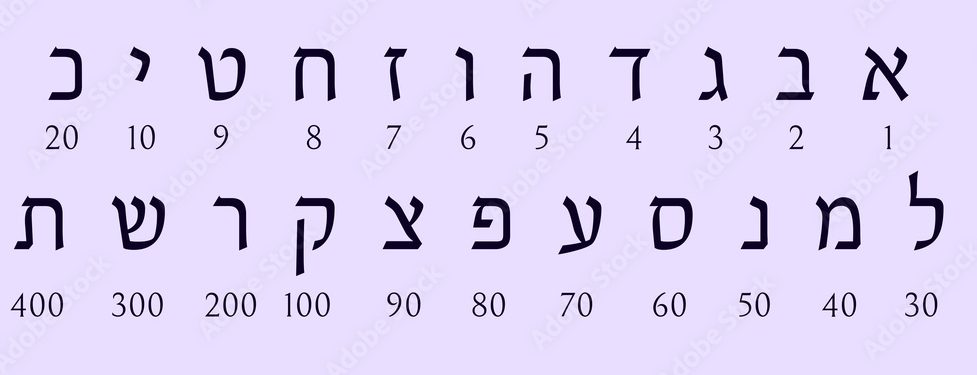Hebrew Words: Father, Son, Grandson
The Hebrew alphabet (aleph-bet) has 22 letters. Each of these 22 letters is correlated with a specific number, as there are no “numbers” in Hebrew as we know them today. Gematria is not a Hebrew word but Greek. Basically, gematria is the computation of individual letters of words, or entire phrases and sentences utilizing their numerical equivalence. For instance, the first letter has numerical value of 1, the second letter has 2, etc. The Biblical commentators believe that the words in the Tanach are connected through their numerical values and thus understood in relation to those numerical values. It is well accepted among the sages that the numerical word value is not unintentional but rather prearranged by the Author of the Hebrew Scripture. Thus, the Hebrew numerology, called gematria, is a system in which every letter of the Hebrew aleph-bet has a numerical value. A similar system to gematria but equivalent to it is Notrikun. Notrikun is a system of acrostics, in which sets of letters, such as the initial or final letters of certain words, taken in order, form a word or phrase. But nutrikon is more of Bible code, rather than gematria, which we addressed in other occasions.
What is the purpose of the Hebrew gematria?
Gematria brings deeper understanding of the Hebrew text. If two words or phrases have the same numerical value, they are seen as related, not necessarily the same in meaning. This relationship may not be obvious and thus it is a subject of interpretation. For instance, the numerical value of the Hebrew word דָּם dam, blood, is 44; dalet equals 4 and mem equals 40 (see the table above). Dam, “blood”, is related to the Hebrew word אָדַם adam, which means human, mankind, or man. What is the etymological connection between “blood” and “man” in English? None, but in Hebrew these words are closely related. A person’s blood is formed through the blending of his mother and father’s blood, but more particularly their DNA in the blood, as it is said,
Therefore, a man shall leave his father and mother, and cleave to his wife, and they shall become one flesh. (Gen 2:24)
In the Hebrew text above, “mother” is אֵם eym, which has the numerical value 41 (aleph is 1 and mem is 40) in gematria, and father is אָב av, which equals 3 in gematria. The total value of mother and father is 44, the same as the numerical value of the blood they create together in their offspring: their sons, Hebrew בֵּן ben, the twin brothers Kayin and Hevel. Woman is the being with whom man can become one flesh. And the child is thus created by both parents, and there in the child, their flesh is united into one flesh. Thus, human life has three co-creators: The Eternal, the wife and the husband. All three must be in agreement to create a new life. This we explained in The Three Co-creators of Life .
“A Jewish mother can take care of ten children, but ten children cannot take care of one mother”. Yiddish adage
Another curious example of how Hebrew grammar works is family relationships. In Hebrew language, family relationships share a common letter in such a way that the last letter of a generation is the first letter in the next generation. For instance, “Father”, אָב av starts with the first letter of the Hebrew aleph-bet, being the beginning of the generations, and ends with the second Hebrew letter ב bet. Bet is also the first letter in the word “son”, בֵּן ben, which is the second generation after the father. “Son” בֵּן ben ends with the letter נ nun. But this is the first letter of the next generation, namely, “grandson”, which is נֶכֶד neched, the third generation. “Grandson”, neched ends with the letter ד dalet. Dalet is the first letter of the next generation, “fourth generation”, namely, the great-grandson (Hebrew dor reviei) דוֹר dor, “generation”, and רְבִיעִי reviei, “forth”, as found in, “But in the fourth generation they will they return here” (Gen 15:16). “Great-grandson” dor reviei is the fourth generation after the father. In modern Hebrew, “great-grandson” is the word נִין niyn. Now, the Hebrew Bible student knows that there are no Hebrew words for “grandson”, “great-grandson”, etc., as there are no Hebrew words for “grandfather”, “great-grandfather”, etc. in that matter. The words for “grandson”, נֶכֶד neched, and “great-grandson”, נִין niyn, are modern Hebrew words, yet they fit well in the pattern. The words the Hebrew Scripture uses are אָב av for “father” and בֵּן ben, for “son”, and these words are used for all generations: “grandfather” and “grandson”. Hence, Avraham is a father of Ya’akov, who is actually his grandson, but also a father of David; the same for the word “grandson”.
Is that connection between family relationships merely coincidental or it is by design?
Knowledge known to only a few will die out. If you feel blessed by these teachings of Time of Reckoning Ministry, help spread the word!
May we merit seeing the coming of our Mashiach speedily in our days!

